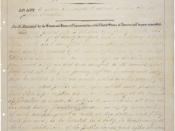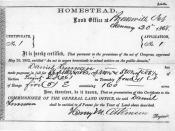The free-homestead policy of 1862 seemed to work very well. Towards the end of the nineteenth century, more Americans moved to the West than ever before. Removal of Indian claims to the land seemed to leave nothing in the way of the westward movement. Despite ambitious land policies by the General Land Office, Homesteaders were faced with many obstacles, including fraud, speculation, and land monopoly (Draffan). The majority of Western settlement can be credited to the railroads, which proved to be far better homesteading agents than those established by many government agencies.
The original intent of the Homestead Act was to defeat land monopoly. Many farmers, however, lacked the economic means to move West and manage a farm. "Fewer still understood the new type of agriculture" (Blum, 453) that the Great Plains required. Instead, speculators and corporate interests were able to reap in profits, and fraud and corruption "often marked the process of land transactions" (Draffan).
The Homestead Act's biggest weakness however, was not taking into account conditions on the frontier. Its Eastern framers did not consider that 160-acre plots were "too large for irrigated farming and too small for dry farming" (Blum, 453). Even when Easterners attempted to revise the land policy, they failed. The Timber and Desert Land Acts, served only to attract lumber tycoons and cattlemen. In the end, homesteaders were often forced to settle on less fruitful tracts, or pay the higher price asked by speculators.
Farmers finally received a break, with the railroads. Under the Pacific Railroad Act, "land grants made possible the speedy construction" (Draffan) of the Union Pacific, Central Pacific, Northern Pacific, Santa Fe, and Southern Pacific railroads. Led by railroad promoters to believe in a bountiful West that had "only to be tickled with a hoe to laugh with a harvest"(Pence),


